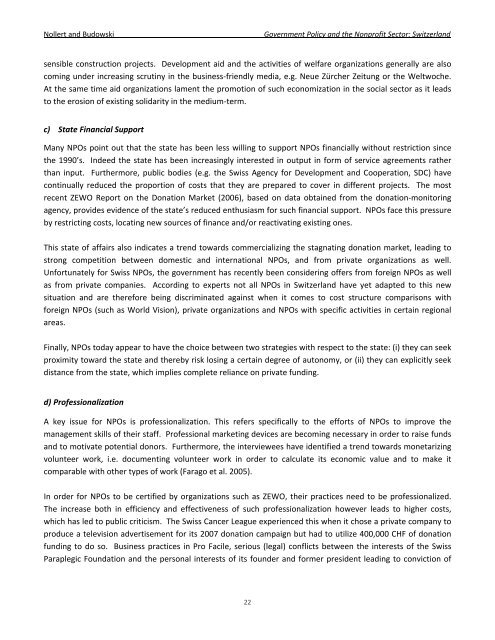Government Policy and the Nonprofit Sector: Switzerland - VMI
Government Policy and the Nonprofit Sector: Switzerland - VMI
Government Policy and the Nonprofit Sector: Switzerland - VMI
- TAGS
- nonprofit
- switzerland
- vmi.ch
You also want an ePaper? Increase the reach of your titles
YUMPU automatically turns print PDFs into web optimized ePapers that Google loves.
Nollert <strong>and</strong> Budowski <strong>Government</strong> <strong>Policy</strong> <strong>and</strong> <strong>the</strong> <strong>Nonprofit</strong> <strong>Sector</strong>: Switzerl<strong>and</strong><br />
sensible construction projects. Development aid <strong>and</strong> <strong>the</strong> activities of welfare organizations generally are also<br />
coming under increasing scrutiny in <strong>the</strong> business‐friendly media, e.g. Neue Zürcher Zeitung or <strong>the</strong> Weltwoche.<br />
At <strong>the</strong> same time aid organizations lament <strong>the</strong> promotion of such economization in <strong>the</strong> social sector as it leads<br />
to <strong>the</strong> erosion of existing solidarity in <strong>the</strong> medium‐term.<br />
c) State Financial Support<br />
Many NPOs point out that <strong>the</strong> state has been less willing to support NPOs financially without restriction since<br />
<strong>the</strong> 1990’s. Indeed <strong>the</strong> state has been increasingly interested in output in form of service agreements ra<strong>the</strong>r<br />
than input. Fur<strong>the</strong>rmore, public bodies (e.g. <strong>the</strong> Swiss Agency for Development <strong>and</strong> Cooperation, SDC) have<br />
continually reduced <strong>the</strong> proportion of costs that <strong>the</strong>y are prepared to cover in different projects. The most<br />
recent ZEWO Report on <strong>the</strong> Donation Market (2006), based on data obtained from <strong>the</strong> donation‐monitoring<br />
agency, provides evidence of <strong>the</strong> state’s reduced enthusiasm for such financial support. NPOs face this pressure<br />
by restricting costs, locating new sources of finance <strong>and</strong>/or reactivating existing ones.<br />
This state of affairs also indicates a trend towards commercializing <strong>the</strong> stagnating donation market, leading to<br />
strong competition between domestic <strong>and</strong> international NPOs, <strong>and</strong> from private organizations as well.<br />
Unfortunately for Swiss NPOs, <strong>the</strong> government has recently been considering offers from foreign NPOs as well<br />
as from private companies. According to experts not all NPOs in Switzerl<strong>and</strong> have yet adapted to this new<br />
situation <strong>and</strong> are <strong>the</strong>refore being discriminated against when it comes to cost structure comparisons with<br />
foreign NPOs (such as World Vision), private organizations <strong>and</strong> NPOs with specific activities in certain regional<br />
areas.<br />
Finally, NPOs today appear to have <strong>the</strong> choice between two strategies with respect to <strong>the</strong> state: (i) <strong>the</strong>y can seek<br />
proximity toward <strong>the</strong> state <strong>and</strong> <strong>the</strong>reby risk losing a certain degree of autonomy, or (ii) <strong>the</strong>y can explicitly seek<br />
distance from <strong>the</strong> state, which implies complete reliance on private funding.<br />
d) Professionalization<br />
A key issue for NPOs is professionalization. This refers specifically to <strong>the</strong> efforts of NPOs to improve <strong>the</strong><br />
management skills of <strong>the</strong>ir staff. Professional marketing devices are becoming necessary in order to raise funds<br />
<strong>and</strong> to motivate potential donors. Fur<strong>the</strong>rmore, <strong>the</strong> interviewees have identified a trend towards monetarizing<br />
volunteer work, i.e. documenting volunteer work in order to calculate its economic value <strong>and</strong> to make it<br />
comparable with o<strong>the</strong>r types of work (Farago et al. 2005).<br />
In order for NPOs to be certified by organizations such as ZEWO, <strong>the</strong>ir practices need to be professionalized.<br />
The increase both in efficiency <strong>and</strong> effectiveness of such professionalization however leads to higher costs,<br />
which has led to public criticism. The Swiss Cancer League experienced this when it chose a private company to<br />
produce a television advertisement for its 2007 donation campaign but had to utilize 400,000 CHF of donation<br />
funding to do so. Business practices in Pro Facile, serious (legal) conflicts between <strong>the</strong> interests of <strong>the</strong> Swiss<br />
Paraplegic Foundation <strong>and</strong> <strong>the</strong> personal interests of its founder <strong>and</strong> former president leading to conviction of<br />
22











